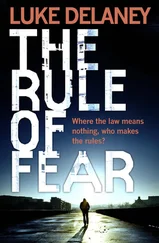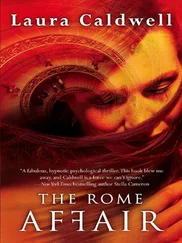My mattress was craggy with books by the time we got around to lying down together, hardly even pretending to read anymore. It's probably true that the room was too hot for the sweater she was wearing. And it's probably true that the room would've been too hot for the sweater she was wearing even if the air-conditioning had been on and the snow had been falling the way it did Easter weekend. She was wearing a T-shirt beneath it, and a black bra under that, but it was watching Katie take off that sweater, and seeing the way it left her hair mussed, strands floating in a halo of static electricity, that gave me the feeling Tantalus never quite got to, that a sensational future had finally pressed itself up against a heavy, hopeful present, throwing the switch that completes the circuit of time.
When my turn came around to take clothes off, to share with Katie the wreckage of my left leg, scars and all, I never hesitated; and when she saw them, neither did she. Had we spent those hours in the dark, I would never have made anything of it. But we were never in the dark that night. We rolled, one over another, across Saint Thomas More and the pages of his Utopia, into the new positions of our relationship, and the lights were always burning.
The first sign that I'd misunderstood the forces at work in my life came the following week. Paul and I spent much of the next Monday and Tuesday debating the meaning of the newest riddle: How many arms from your feet to the horizon?
I think it has to do with geometry, Paul said.
Euclid?
But he shook his head. Earth measurement. Eratosthenes approximated the earth's circumference by figuring out the different angles of the shadows cast in Syene and Alexandria at noon on the summer solstice. Then he used the angles…
I realized only midway through his explanation that he was using an etymological sense of the word geometry-literally, as he'd said, earth measurement.
So that, knowing the distance between the two cities, he could triangulate back to the curvature of the earth.
What does that have to do with the riddle? I said.
Francesco's asking for the distance between you and the horizon. Calculate how far it is from any given point in the world to the line where the earth curves over, and you've got an answer. Or just look it up in your physics textbook. It's probably a constant.
He said it as if the answer were a foregone conclusion, but I suspected otherwise.
Why would Colonna ask for that distance in arms? I asked.
Paul leaned over and crossed out arms on my copy, replacing it with something in Italian. That should probably be braccia, he said. It's the same word, but braccia were Florentine units of measurement. One braccio is about the length of an arm.
For the first time, I was sleeping less than he was, the sudden high in my life needling me to keep pressing my luck, to keep mixing my drinks, because this cocktail of Katie and Francesco Colonna seemed to be just what the doctor ordered. I took it as a sign, the fact that my return to the Hypnerotomachia had brought a new structure to the world I lived in. Quickly I began to fall into my father's trap, the one my mother tried to warn me about.
Wednesday morning, when I mentioned to Katie that I'd dreamt of my father, she did something that in all our days of jogging she'd never done before: she stopped.
Tom, I don't want to keep talking about this, she said.
About what?
Paul's thesis. Let's talk about something else.
I was telling you about my dad.
But I'd grown too used to conversations with Paul, invoking my father's name in any situation and expecting it to deflate all criticism.
Your dad worked on the book Paul's studying, she said. It's the same thing.
I mistook the sentiment behind her words for fear: fear that she would be unable to solve another riddle the way she solved the last one, and that my interest in her might fade.
Fine, I said, thinking I was saving her from that. Let's talk about something else.
And so a period of many pleasant weeks began, built on a misunderstanding as complete as the one we started with. In the first month we dated, up until the night Katie spent at Dod, she built a facade for me, trying to create something she thought I wanted; and in the second month I returned the favor, avoiding all mention of the Hypnerotomachia in front of her, not because its significance had diminished in my life, but because I thought Colonna's riddles made her uneasy.
Had she known the truth, Katie would've been right to worry. The Hypnerotomachia was slowly beginning to bully my other thoughts and interests out of focus. The balance I thought I'd struck between Paul's thesis and nine-the waltz between Mary Shelley and Francesco Colonna, which I imagined more vividly the more time I spent with Katie-was devolving into a tug of war, which Colonna gradually won.
Still, before Katie and I knew it, trails had formed in every corner of our shared experience. We ran the same paths each morning; stopped at the same coffee shops before class; and snuck her into my eating club the same ways when my guest passes ran out. Thursday nights we danced with Charlie at Cloister Inn; Saturday nights we shot pool with Gil at Ivy; and Friday nights, when the clubs on Prospect fell quiet, we watched friends perform in Shakespeare comedies or orchestra concerts or a cappella shows across campus. The adventure of our first days together gradually blossomed into something else: a feeling I'd never had with Lana or any of her predecessors, which I can only compare to the sensation of returning home, of joining a balance that needs no adjusting, as if the scales of my life had been waiting for her all along.
The first night Katie noticed I couldn't sleep, she recited a work by her favorite author for me, and I followed Curious George to the ends of the earth, where the weight on my eyelids carried me off. After that, there were many nights I tossed and turned, and Katie found a solution for each of them. Late-night episodes of M*A*S*H; long readings from Camus; radio programs she used to listen to at home, now caught on a faint transmission down the coast. We left the windows open sometimes, to hear the rain in late February, or the conversations of drunk freshmen. There was even a rhyming game we invented for empty nights, something Francesco Colonna might not have found as edifying as Rithmomachia, but that we enjoyed just the same.
There once was a man named Camus, I would say, leading her.
When Katie smiled at night, she was like a Cheshire cat in the dark.
Who left U. Algiers with the flu, she would respond.
He had lots of potential.
But was not existential.
Which made old Jean-Paul Sartre so blue.
But for all the ways Katie had found to make me sleep, the Hypnerotomachia still kept me awake more often than not. I'd figured out what the smallest harmony of a great victory was: in Rithmomachia, where the goal is to establish number patterns containing arithmetical, geometric, or musical harmonies, only three sequences produce all three harmonies at once-the requirement for a great victory. The smallest of these, the one Colonna wanted, was the sequence 3-4-6-9.
Paul quickly took the numbers and made a cipher of them. He read the third letter, then the fourth after that, followed by the sixth and ninth, from the appropriate chapters; and within an hour, we had another message from Colonna:
I begin my story with a confession. In the keeping of this secret many men have died. Some have perished in the construction of my crypt, which, imagined by Bramante and executed by my Roman brother Terragni, is an unequalled contrivance for its purpose, impervious to all things, but above all to -water. It has taken many victims, even among the most experienced men. Three have died in the movement of great stones, two in the felling of trees, five in the process of building itself Others of the dead I do not mention, for they have perished shamefully and will be forgotten.
Читать дальше












